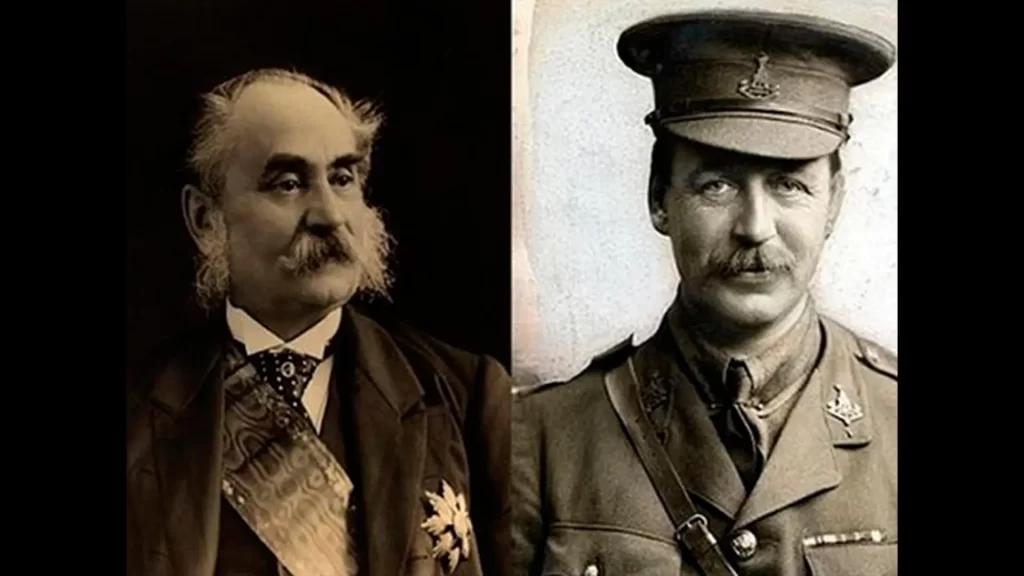The Sykes-Picot Agreement was signed between France and Britain on the division of the Arab states in the eastern Mediterranean in 1916. It was reached between April and May of that year in the form of an exchange of documents between the foreign ministries of the three countries (France, England and Tsarist Russia).
The French government appointed “George Picot” its former Consul General in Beirut as a High Commissioner to follow up on the affairs of the Near East, and negotiate with the British government in the future of the Arab countries, and soon traveled to Cairo, and met with “Mark Sykes” British High Commissioner for Near Eastern Affairs, under the supervision of the representative of Russia, and these meetings and correspondence resulted in an agreement known as the “Cairo Secret Agreement”, and then they moved to the Russian city of Petersburg, and these negotiations resulted in a tripartite agreement called the Sykes-Picot Agreement in order to determine the areas of influence of each state as follows:
France seizes western Syria, Lebanon and Adana province.
Britain’s seizure of southern and central Iraq, including Baghdad, as well as the ports of Acre and Haifa in Palestine.
Russia’s seizure of the Armenian provinces of Turkey and northern Kurdistan.
Russia’s right to defend the interests of the Orthodox in the holy places in Palestine.
– The area between the regions obtained by France, and those obtained by Britain is the union of Arab states or unified Arab countries, however, this state is divided into British and French areas of influence, and French influence includes eastern Levant and Mosul province, while British influence extends to Transjordan and the northern part of Baghdad province and even the Iranian border.
The remaining part of Palestine is under international administration.
– The port of Iskenderun becomes free.
The agreement was revealed with the arrival of the Communists to power in Russia in 1917, angering the Syrian people, who are directly affected by the agreement and embarrassing France and Britain.
The region was divided under the agreement, so France obtained the largest part of the Levant, a large part of southern Anatolia and the Mosul region in Iraq, while Britain extended its areas of control from the southern Levant, expanding eastward to include Baghdad, Basra and all areas between the Arabian Gulf and the French region.
It was also decided to place the area that was later carved out of southern Syria (Palestine) under an international administration to be agreed upon in consultation between Britain and France (later, under the Balfour Declaration to the Jews, Palestine was given to the Zionists to build the State of Israel).
But the agreement stipulated that Britain would grant the ports of Haifa and Acre, with France free to use the port of Haifa, and France would give Britain in return the use of the port of Iskenderun that would have fallen under its control.
Terms of the agreement:
Article One:
France and Great Britain are prepared to recognize and protect an Arab State headed by an Arab President in Areas A (the interior of Syria) and B (the interior of Iraq) shown in the map annexed to this agreement. France in Area A and England in Area B shall have priority right in local projects and loans, and France in Area A and England in Area B shall be unique in providing foreign consultants and personnel at the request of the Arab Government or the Arab Government Alliance.
Article Two:
France in the Blue Zone (coastal Syria) and England in the Red Zone (Basra region) may establish whatever form of government they wish, directly, through mediation or monitoring, after agreement with the government or the alliance of Arab governments.
Article III:
An international administration shall be established in the African region (Palestine), the composition of which shall be determined after consulting Russia and in agreement with the rest of the allies and representatives of the Sharif of Mecca.
Article IV: England shall receive the following:
– Haifa and Acre ports.
– A limited amount of the Tigris and Euphrates waters shall be guaranteed in Area A to Area B, and His Majesty’s Government undertakes for its part not to give up in any negotiations with another State the ceding of the island of Cyprus except with the prior consent of the French Government.
Article Five:
Iskenderun shall be a free port for the trade of the British Empire, and no different transactions shall arise in port fees, nor shall special facilities be imposed for British navigation and cargo. Free transport of English goods is permitted by Alexandretta and the Blue Zone Railway, whether coming into or originating from the Red Zone or Zones A and B.
No different transactions, directly or indirectly, arise on any of the railways or at any of the ports of the said areas affecting British goods and ships. Haifa shall be a free port for the trade of France, its colonies and the countries under its protection, and there shall be no difference in transactions and there shall be no refusal to give facilities for navigation and French goods, and the carriage of goods shall be free by way of Haifa and on the English railway in the black area (Palestine), whether the goods originate from or import from the blue or red zone, or from areas A and B.
There shall be not the slightest difference in treatment, directly or indirectly, affecting French goods or ships on any railway or in one of the said ports.
Article Six:
The Baghdad Railway shall not be extended in Area A beyond Mosul in the south, nor beyond Samarra in the north, until a railway connecting Baghdad to Aleppo through the Euphrates Valley is constructed, with the assistance of the two governments.
Article Seven:
Great Britain shall have the right to establish, administer and be the sole owner of a railway connecting Haifa to Area B, and shall otherwise have a permanent right to transport troops at any time along such a line.
It should be known to both Governments that this line should facilitate Haifa’s connection with Baghdad, and that if the establishment of the line of communication in the Samarra region is prevented by technical difficulties or ample expenses for its management that make it impossible to establish, the French Government will allow it to pass through the Barboura-um Qais-Malaga-Idar-Ghasta-Maghayer road until it reaches Area B.
Article Eight:
The Turkish customs tariff shall remain in force for twenty years in all regions of the blue and red zones in the regions (A) and (B), so no premium shall be added to the fees, and the valuation rule in the fees shall not be replaced by the rule of taking the eye, except by agreement between the two governments. Internal customs shall not be established between any region and another in the above-mentioned areas, and customs duties imposed on goods sent shall be paid at the port and given to the administration of the area to which the goods are sent.
Article IX:
It is agreed that the French Government shall not negotiate at any time to cede its rights, nor shall it grant its rights in the Blue Zone to another State other than the State or the Alliance of Arab States, without the prior consent of His Majesty’s Government, which undertakes to do so to the French Government in the Red Zone.
Article Ten:
The English and French governments, as protectors of the Arab state, agree that they shall neither possess nor permit a third state to possess countries in the Arabian Peninsula, or establish a naval base on the eastern Mediterranean coast, but this shall not preclude a correction in the borders of Aden that may become necessary due to the hostility of the latter Turks.
Article XI:
Negotiations with the Arabs shall continue in the same manner as before by the two governments to determine the borders of the state or the alliance of Arab states.
Article XII:
Except for the above, it is agreed that the two governments shall consider the means necessary to control the importation of arms to Arab countries


